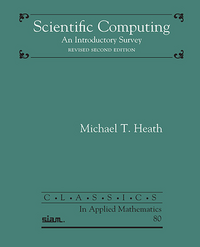Numerical Analysis (CS 450) Fall 2021
| What | Where |
|---|---|
| Time/place | Tue/Thu 11:00am--12:15pm 0027/1025 Campus Instructional Facility / Catalog |
| Class URL | https://bit.ly/cs450-f21 |
| Class recordings | Illinois Mediaspace |
| Live Lecture | Meeting Link |
| Online Office Hours | Meeting Link (on Zoom) |
| Web forum | Discuss » · Help Desk |
| Instant Message | Send » |
| Calendar | View » |
Quizzes
Older quizzes
- Quiz for lecture 25
- Quiz for lecture 24
- Quiz for lecture 23
- Quiz for lecture 22
- Quiz for lecture 21
- Quiz for lecture 20
- Quiz for lecture 19
- Quiz for lecture 18
- Quiz for lecture 17
- Quiz for lecture 16
- Quiz for lecture 15
- Quiz for lecture 14
- Quiz for lecture 13
- Quiz for lecture 12
- Quiz for lecture 11
- Quiz for lecture 10
- Quiz for lecture 9
- Quiz for lecture 8
- Quiz for lecture 7
- Quiz for lecture 6
- Quiz for lecture 5
- Quiz for lecture 4
- Quiz for lecture 3
- Quiz for lecture 2
You can also find past quizzes under their corresponding lecture in the class calendar.
Homework
- Homework Set 1 (due: Sep 1, 2021, 10pm)
- Homework Set 2 (due: Sep 8, 2021, 10pm)
- Homework Set 3 (due: Sep 22, 2021, 10pm)
- Homework Set 4 (due: Sep 29, 2021, 10pm)
- Homework Set 5 (due: Oct 15, 2021, 10pm)
- Homework Set 6 (due: Oct 20, 2021, 10pm)
- Homework Set 7 (due: Nov 3, 2021, 10pm)
- Homework Set 8 (due: Nov 12, 2021, 10pm)
- Homework Set 9 (due: Dec 1, 2021, 10pm)
- Homework Set 10 (due: Dec 8, 2021, 10pm. May be turned in without penalty until Dec 10, 2021 10pm.)
4-Credit Hour Assignment
- Assignment 1 (4-credit hour) (due: Nov 9, 2021, 10pm)
- Assignment 2 (4-credit hour) (due: Dec 8, 2021, 10pm. May be turned in without penalty until Dec 10, 2021 10pm.)
Exams
Please find information on our upcoming exams in the corresponding section of the class calendar. Reserve your time slots in the testing facility as soon as possible--otherwise your preferred times may no longer be available.
Course Outline
-
Introduction to Scientific Computing
- Notes
- Notes (unfilled, with empty boxes)
- About the Class
- Errors, Conditioning, Accuracy, Stability
- In-Class Activity: Forward/Backward Error
- Floating Point
- In-Class Activity: Floating Point
- Demo: Catastrophic Cancellation
- Demo: Conditioning of Evaluating tan
- Demo: Density of Floating Point Numbers
- Demo: Floating Point and the Series for the Exponential Function
- Demo: Floating Point vs Program Logic
- Demo: Floating point and the Harmonic Series
- Demo: Picking apart a floating point number
- Demo: Truncation vs Rounding
- Demo: Vector Norms
- Demo: Writing Testable Numerics Code
-
Systems of Linear Equations
- Theory: Conditioning
- In-Class Activity: Matrix Norms and Conditioning
- Methods to Solve Systems
- LU: Application and Implementation
- In-Class Activity: LU
- Demo: Coding back-substitution
- Demo: Complexity of Mat-Mat multiplication and LU
- Demo: Condition number visualized
- Demo: Conditioning of 2x2 Matrices
- Demo: LU Factorization with Partial Pivoting
- Demo: LU Factorization
- Demo: Matrix norms
- Demo: Sherman-Morrison
- Demo: Vanilla Gaussian Elimination
-
Linear Least Squares
- Introduction
- In-Class Activity: Least Squares
- Sensitivity and Conditioning
- Solving Least Squares
- In-Class Activity: QR
- In-Class Activity: Householder, Givens, SVD
- Demo: 3x3 Givens demo
- Demo: 3x3 Householder demo
- Demo: Gram-Schmidt and Modified Gram-Schmidt
- Demo: Gram-Schmidt--The Movie
- Demo: Image compression
- Demo: Interactive Polynomial Fit
- Demo: Issues with the normal equations
- Demo: Keeping track of coefficients in Gram-Schmidt
- Demo: Normal equations vs Pseudoinverse
- Demo: Polynomial fitting with the normal equations
- Demo: Relative cost of matrix factorizations
-
Eigenvalue Problems
- Properties and Transformations
- Sensitivity
- Computing Eigenvalues
- In-Class Activity: Eigenvalues
- Krylov Space Methods
- Demo: Arnoldi Iteration
- Demo: Bauer-Fike Eigenvalue Sensitivity Bound
- Demo: Computing the SVD
- Demo: Exploring the Numerical Range
- Demo: Householder Similarity Transforms
- Demo: Orthogonal Iteration
- Demo: Power iteration and its Variants
- Demo: Rounding in characteristic polynomial using SymPy
-
Nonlinear Equations
- Introduction
- In-Class Activity: Krylov and Nonlinear Equations
- Iterative Procedures
- Methods in One Dimension
- In-Class Activity: Nonlinear Equations
- Methods in $n$ Dimensions (``Systems of Equations'')
- Demo: Bisection Method
- Demo: Convergence of Newton's Method
- Demo: Convergence of the Secant Method
- Demo: Fixed point iteration
- Demo: Newton's Method
- Demo: Newton's method in n dimensions
- Demo: Rates of Convergence
- Demo: Secant Method
- Demo: Three quadratic functions
-
Optimization
- Introduction
- Methods for unconstrained opt. in one dimension
- In-Class Activity: Optimization Theory
- Methods for unconstrained opt. in $n$ dimensions
- In-Class Activity: Optimization Methods
- Nonlinear Least Squares
- Constrained Optimization
- Demo: Conjugate Gradient Method
- Demo: Gauss-Newton
- Demo: Golden Section Proportions
- Demo: Nelder-Mead Method
- Demo: Newton's Method in 1D
- Demo: Newton's Method in n dimensions
- Demo: Sequential Quadratic Programming
- Demo: Steepest Descent
-
Interpolation
- Introduction
- Methods
- In-Class Activity: Interpolation
- Error Estimation
- Piecewise interpolation, Splines
- Demo: Chebyshev interpolation
- Demo: Choice of Nodes for Polynomial Interpolation
- Demo: Composite Gauss Interpolation Error
- Demo: Interpolation Error
- Demo: Interpolation with Radial Basis Functions
- Demo: Jump with Chebyshev Nodes
- Demo: Monomial interpolation
- Demo: Orthogonal Polynomials
- Demo: Playing with Barycentric Interpolation
-
Numerical Integration and Differentiation
- Numerical Integration
- Quadrature Methods
- Accuracy and Stability
- Gaussian Quadrature
- Composite Quadrature
- Numerical Differentiation
- Richardson Extrapolation
- In-Class Activity: Differentiation and Quadrature
- Demo: Accuracy of Newton-Cotes
- Demo: Finite Differences vs Noise
- Demo: Floating point vs Finite Differences
- Demo: Gaussian quadrature weight finder
- Demo: Newton-Cotes weight finder
- Demo: Richardson with Finite Differences
- Demo: Taking Derivatives with Vandermonde Matrices
-
Initial Value Problems for ODEs
- Existence, Uniqueness, Conditioning
- Numerical Methods (I)
- Accuracy and Stability
- Stiffness
- Numerical Methods (II)
- In-Class Activity: Initial Value Problems
- Demo: Backward Euler stability
- Demo: Dissipation in Runge-Kutta Methods
- Demo: Forward Euler stability
- Demo: Predator-Prey System
- Demo: Stability regions
- Demo: Stiffness
-
Boundary Value Problems for ODEs
- Existence, Uniqueness, Conditioning
- Numerical Methods
- Demo: Finite differences
- Demo: Shooting method
- Demo: Sparse matrices
- Partial Differential Equations and Sparse Linear Algebra
- Fast Fourier Transform
- Additional Topics
CAUTION!
These scribbled PDFs are an unedited reflection of what I wrote during class. They need to be viewed in the context of the class discussion that led to them. See the lecture videos for that.
If you would like actual, self-contained class notes, look in the outline above.
These scribbles are provided here to provide a record of our class discussion, to be used in perhaps the following ways:
- as a way to cross-check your own notes
- to look up a formula that you know was shown in a certain class
- to remind yourself of what exactly was covered on a given day
By continuing to read them, you acknowledge that these files are provided as supplementary material on an as-is basis.
- lec01-2021-08-24.pdf
- lec02-2021-08-26.pdf
- lec03-2021-08-31.pdf
- lec04-2021-09-02.pdf
- lec05-2021-09-07.pdf
- lec06-2021-09-09.pdf
- lec07-2021-09-14.pdf
- lec08-2021-09-16.pdf
- lec09-2021-09-21.pdf
- lec10-2021-09-23.pdf
- lec11-2021-09-28.pdf
- lec12-2021-09-30.pdf
- lec13-2021-10-05.pdf
- lec14-2021-10-07.pdf
- lec15-2021-10-12.pdf
- lec16-2021-10-14.pdf
- lec17-2021-10-19.pdf
- lec18-2021-10-21.pdf
- lec19-2021-10-26.pdf
- lec20-2021-10-28.pdf
- lec21-2021-11-02.pdf
- lec22-2021-11-04.pdf
- lec23-2021-11-09.pdf
- lec24-2021-11-11.pdf
- lec25-2021-11-16.pdf
- lec26-2021-11-18.pdf
- lec27-2021-11-30.pdf
- lec28-2021-12-02.pdf
- lec29-2021-12-07.pdf
Team






Textbook

Michael T. Heath, Revised Second Edition, Society for Industrial and Applied Mathematics
Also see our class Piazza forum for a discount code for purchasing the book from SIAM.
Computing
We will be using Python with the libraries numpy, scipy and matplotlib for in-class work and assignments. No other languages are permitted. Python has a very gentle learning curve, so you should feel at home even if you've never done any work in Python.
Running Code on your Own Computer
While running code in this online system should technically suffice to do your work for this class, you may find it useful to also install Python on your own computer.
The recommended and perhaps one of the easier ways of doing so involves downloading the Anaconda Python distribution. Note that this is a commercial product (even if it is free of charge), and this is not intended as an endorsement of the company or the product. Note that we cannot promise to provide technical support for this installation.
Another way to obtain a Python installation is through a virtual machine image:
Grading Policies
Python Help
(see section 1 of the outline for more)
- Python tutorial
- Facts and myths about Python names and values
- Learn Python the hard way
- Project Euler (Lots of practice problems)
- From Python to Numpy
- PythonTutor (Execute Python step-by-step, with pictures)
Python workshop material
- Video: Located on Echo 360 along with the other class recordings
- Tutorial material
- Scipy lecture notes
- CSE workshop training material
Numpy Help
(see section 1 of the outline for more)
- Introduction to Python for Science
- The SciPy lectures
- The Numpy MedKit by Stéfan van der Walt
- The Numpy User Guide by Travis Oliphant
- Numpy/Scipy documentation
- More in this reddit thread
- An introduction to Numpy and SciPy